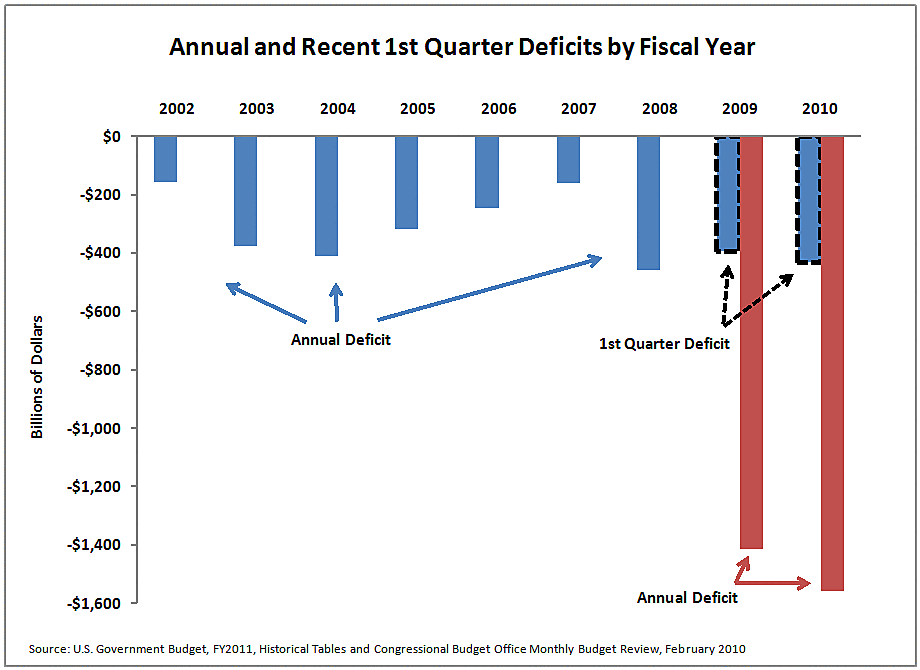That is the title of a 2003 New York Times column by economist Paul Krugman. The gist of his column was that the Bush tax cuts and future entitlement program liabilities would usher in calamitous deficits. Setting aside the tax cut and entitlements issue, Krugman’s comments on the dangers of deficits are interesting considering seven years later Krugman is one of the most prominent supporters of massive deficit spending to stimulate the economy.
Here are some selected Krugman quotes from the column:
With war looming, it’s time to be prepared. So last week I switched to a fixed-rate mortgage. It means higher monthly payments, but I’m terrified about what will happen to interest rates once financial markets wake up to the implications of skyrocketing budget deficits.
Two years ago the administration promised to run large surpluses. A year ago it said the deficit was only temporary. Now it says deficits don’t matter. But we’re looking at a fiscal crisis that will drive interest rates sky-high. A leading economist recently summed up one reason why: ‘When the government reduces saving by running a budget deficit, the interest rate rises.’ Yes, that’s from a textbook by the chief administration economist, Gregory Mankiw.
But my prediction is that politicians will eventually be tempted to resolve the crisis the way irresponsible governments usually do: by printing money, both to pay current bills and to inflate away debt. And as that temptation becomes obvious, interest rates will soar. It won’t happen right away. With the economy stalling and the stock market plunging, short-term rates are probably headed down, not up, in the next few months, and mortgage rates may not have hit bottom yet. But unless we slide into Japanese-style deflation, there are much higher interest rates in our future.
Although this shouldn’t be construed as an endorsement of George Bush’s fiscal policies, the deficit for fiscal year 2003 when Krugman wrote his column was $378 billion. The Congressional Budget Office just reported that the deficit for the first quarter of FY 2010 was $434 billion.
The following chart shows the annual deficits from fiscal years 2002 through 2010 (projected). For 2009 and 2010 the first quarter deficit is also shown. In short, the two most recent first quarter deficits have been about $100 billion higher than the average annual deficits run from 2002 to 2008.
In FY2003, the deficit was 3.4 percent of GDP – for FY2010 it’s projected to be 10.6 percent. According to the President’s optimistic FY2011 budget, annual deficits won’t fall below 3.6 percent of GDP at any point in the next ten years.
Yes, Krugman believes that large deficit spending is necessary to turn the economy around. But that doesn’t change the fact that his dire warnings about deficits in 2003 should apply to today’s even larger deficits, especially now that we’re even closer to an entitlement crisis. However, Krugman recently penned a column warning against “deficit hysteria” in which he makes comments that are more than just a little at odds with his 2003 column:
These days it’s hard to pick up a newspaper or turn on a news program without encountering stern warnings about the federal budget deficit. The deficit threatens economic recovery, we’re told; it puts American economic stability at risk; it will undermine our influence in the world. These claims generally aren’t stated as opinions, as views held by some analysts but disputed by others. Instead, they’re reported as if they were facts, plain and simple.
Yet they aren’t facts. Many economists take a much calmer view of budget deficits than anything you’ll see on TV. Nor do investors seem unduly concerned: U.S. government bonds continue to find ready buyers, even at historically low interest rates. The long-run budget outlook is problematic, but short-term deficits aren’t — and even the long-term outlook is much less frightening than the public is being led to believe.
Scratching your head? I am too.

